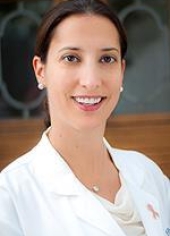Study Finds Correlation between False- Positive Mammograms & Breast Cancer Risk
The following article was written by Elissa Price, M.D., a specialist in Breast Imaging at UCSF Medical Center at Mount Zion.
A study recently published in the Journal of the National Cancer Institute has received much publicity. University of Copenhagen researchers looked at 58,000 women who had mammograms between 1991 and 2005. The study compares risk of developing breast cancer in women who have had a false positive mammogram compared with the risk of developing breast cancer in women who have negative (non-suspicious) mammograms. A false positive mammogram is one where an abnormality is questioned, and therefore the woman undergoes additional mammographic views and possibly an ultrasound. For the majority of women in the US, the questioned abnormality is at that point demonstrated to no longer be suspicious, and the woman is recommended to return to screening. Only a minority of women who get ‘called back’ for additional imaging go on to a minimally-invasive biopsy.
The study reports a 67% increased relative risk of breast cancer in women who have had a false positive mammogram. Prior studies have shown that women with a history of benign biopsy are at increased risk of cancer, so there may be some truth to the concept that women with a false positive mammogram are at increased risk as well. However, this study does not prove that assertion, and certainly not if American women are the population in question. The screening mammography program in Denmark during the study period was extremely different from the recommendations of the American Cancer Society, raising doubts about the applicability of this study to women in the U.S. in 2012. For example, many women in the Danish study did not receive the 4 mammographic views that are standard for every screening mammogram performed here. Very importantly, the entire study data set is based on screen-film mammography. This technique is used in only a minority of American practices today - the majority use more modern digital mammography. UCSF Department of Radiology and Biomedical Imaging uses exclusively digital mammography.
Perhaps most importantly, the authors concede that the risk found in the earlier years of the study (1994-1998) became statistically insignificant in the later years (2000-2005) – that is, for women screened in the 2000’s, there was not an increased risk in breast cancer in women with false positive studies. Improving technology was certainly a major contributor to this change. The study is thus reporting on a risk that perhaps once existed, but may no longer – questioning its relevance to women today.
Nonetheless, this data deepens support for annual screening mammograms. While false positives may cause anxiety and occasionally potentially unnecessary procedures, it is better for patients to be accurately informed of their risk of breast cancer. At UCSF, we choose to find ways to minimize anxiety through prompt diagnostic work up and steady communication with our patients.
This study sheds further light on the importance of women obtaining mammograms regularly, no matter the result of their prior mammogram. Women must understand that choosing to screen less frequently or forgo mammography altogether means forgoing some or all of the potentially life-saving benefit. At UCSF, in accordance with American Cancer Society guidelines, we believe screening mammography should be performed every year in women beginning at age 40.
To see additional research on breast cancer and false positives, please see here.

